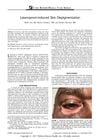 9 citations,
November 2017 in “Journal of Glaucoma”
9 citations,
November 2017 in “Journal of Glaucoma” Latanoprost eye drops may cause skin depigmentation.
 19 citations,
July 2020 in “Journal of drug delivery science and technology”
19 citations,
July 2020 in “Journal of drug delivery science and technology” Nanoemulsions with minoxidil and clove oil effectively target hair follicles for better alopecia treatment.
 6 citations,
March 2019 in “Dermatologic surgery”
6 citations,
March 2019 in “Dermatologic surgery” Chilled ATPv-supplemented saline best preserves hair grafts' key genes.
 15 citations,
August 2006 in “Journal of Cutaneous Pathology”
15 citations,
August 2006 in “Journal of Cutaneous Pathology” HIV-1 may cause increased stem cell death in hair follicles, leading to hair loss.
 13 citations,
March 2015 in “Plastic and reconstructive surgery. Global open”
13 citations,
March 2015 in “Plastic and reconstructive surgery. Global open” Leg hair can be used for eyelash transplants, resulting in fuller lashes with less maintenance.
 14 citations,
September 2010 in “Annals of Plastic Surgery”
14 citations,
September 2010 in “Annals of Plastic Surgery” Hair restoration has evolved from surgery to drugs to potential gene therapy, with improved results and ongoing research driven by high demand.
 21 citations,
July 2002 in “Clinical and Experimental Dermatology”
21 citations,
July 2002 in “Clinical and Experimental Dermatology” Hair care products don't cause hair loss if used correctly.
 2 citations,
June 2020 in “Dermatology and therapy”
2 citations,
June 2020 in “Dermatology and therapy” Narrowband-UVB phototherapy successfully treated a rare case of Graham Little-Piccardi-Lassueur syndrome.
 13 citations,
July 2014 in “The Journal of Dermatology”
13 citations,
July 2014 in “The Journal of Dermatology” Dermoscopy helped diagnose discoid lupus erythematosus in two patients without needing skin biopsies.
 September 2024 in “Journal of the American Academy of Dermatology”
September 2024 in “Journal of the American Academy of Dermatology” Tight hairstyles under hijabs cause traction alopecia, worsened by prolonged wear.
 12 citations,
January 2010 in “Hair transplant forum international”
12 citations,
January 2010 in “Hair transplant forum international” The survival rates of hair grafts are similar regardless of how they are trimmed.

Hair RiseTM microemulsion effectively promotes hair growth and treats hair loss better than standard treatments.
 2 citations,
September 2016 in “Journal of Dermatological Science”
2 citations,
September 2016 in “Journal of Dermatological Science” Squarticles, tiny particles made from sebum-derived lipids, can effectively deliver minoxidil, a hair growth drug, directly to hair follicles and skin cells, with less skin penetration and more tolerability.
 1 citations,
June 2014 in “International Journal of Dermatology”
1 citations,
June 2014 in “International Journal of Dermatology” Pregnancy can trigger follicular mucinosis, which may resolve after delivery.
 July 2008 in “Facial Plastic Surgery Clinics of North America”
July 2008 in “Facial Plastic Surgery Clinics of North America” Men's facial rejuvenation involves unique challenges and is increasingly popular, with many opting for nonsurgical treatments.
37 citations,
May 2018 in “Transgender health” Oral estradiol works for many transgender women but needs personalized dosing and monitoring.
 28 citations,
August 2018 in “Dermatologic Surgery”
28 citations,
August 2018 in “Dermatologic Surgery” Platelet-Rich Plasma (PRP) may help improve hair density in primary cicatricial alopecias (PCAs) patients, but more trials are needed to confirm its benefits.
 11 citations,
August 2017 in “American Journal of Dermatopathology”
11 citations,
August 2017 in “American Journal of Dermatopathology” EVG staining helps tell apart follicular scars from follicular streamers, aiding in diagnosing different types of hair loss.
 8 citations,
February 2016 in “The American Journal of Dermatopathology”
8 citations,
February 2016 in “The American Journal of Dermatopathology” Hair transplants can make hair follicles larger and hair shafts thicker.
 54 citations,
January 2018 in “Scientific reports”
54 citations,
January 2018 in “Scientific reports” Human hair contains diverse proteins, including keratins and histones, which could help assess hair health and aging.
4 citations,
January 2019 in “Archives of clinical and medical case reports” Combining FUE hair transplantation with PRP improves hair density and patient satisfaction in scarring alopecia.
 June 2023 in “Brazilian Journal of Health Review”
June 2023 in “Brazilian Journal of Health Review” Common baldness is a hereditary condition that can be treated with medications or surgery to prevent progression and improve self-esteem.
November 2013 in “Journal of clinical & experimental dermatology research” The follicular unit extraction method for hair transplants is a technique with benefits and drawbacks.
 February 2025 in “Stem Cell Research & Therapy”
February 2025 in “Stem Cell Research & Therapy” Maintaining healthy mitochondria may help treat hair loss.
 31 citations,
October 2017 in “Dermatologic Surgery”
31 citations,
October 2017 in “Dermatologic Surgery” Hair transplants look natural, but the best method is debated, and PRP shows promise for hair regrowth.
 32 citations,
November 2012 in “Aesthetic Surgery Journal”
32 citations,
November 2012 in “Aesthetic Surgery Journal” Hair restoration surgery has advanced, focusing on natural results and may improve further with new techniques and therapies.
 32 citations,
September 2015 in “Dermatology”
32 citations,
September 2015 in “Dermatology” Certain leukemia drugs can cause severe skin reactions that may require stopping treatment.
 14 citations,
March 2019 in “Facial Plastic Surgery Clinics of North America”
14 citations,
March 2019 in “Facial Plastic Surgery Clinics of North America” Hair transplantation can help transgender patients affirm their gender identity.
 1 citations,
July 2021 in “Dermatologic Surgery”
1 citations,
July 2021 in “Dermatologic Surgery” Removing the outer layer of skin cells from hair grafts does not change the graft survival rate but may improve how it looks right after surgery.
 15 citations,
February 2017 in “International Journal of Women's Dermatology”
15 citations,
February 2017 in “International Journal of Women's Dermatology” Hair aging and loss are caused by genetics, hormones, environment, and grooming, with treatments like minoxidil effective for certain types of hair loss.



























